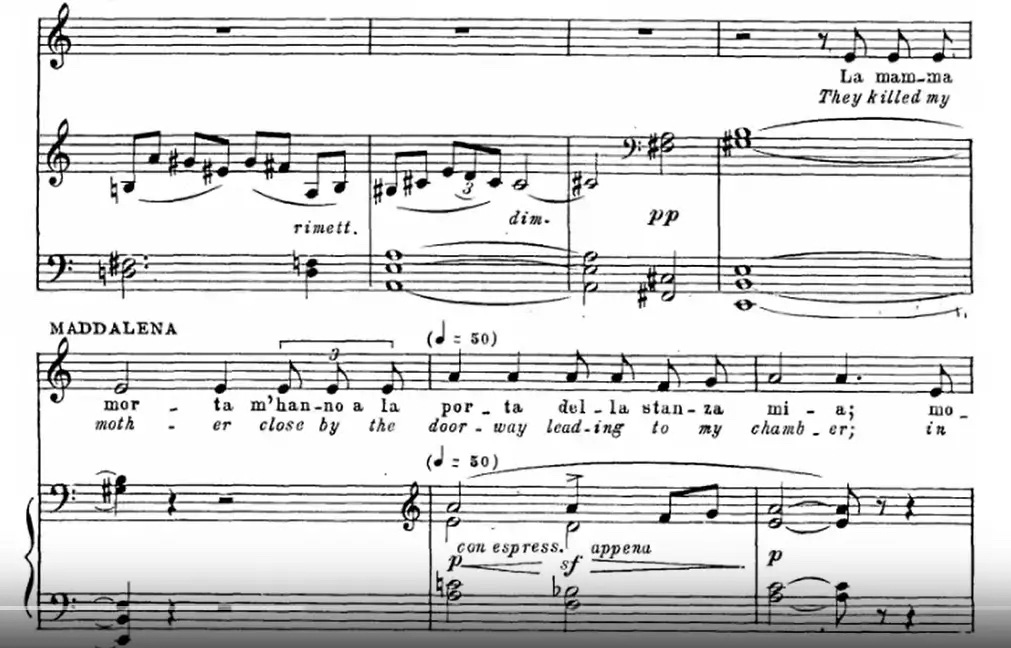Opera Daily 🎶 — Callas in "Philadelphia"
This week's Opera Daily features the iconic aria "La mamma morta" and its unforgettable role in the 1993 movie Philadelphia
👋 Hello to the new Opera Daily subscribers who have joined us this week. I hope you’re sitting on a plushy couch with a warm beverage and enjoying your weekend. You can check out the complete Opera Daily archives and the playlist on YouTube for more selections. If you were forwarded this email by a friend, join us by subscribing here:
Recently, several of our readers shared a personal story about the 1993 movie Philadelphia and how they were captivated by a scene in which Tom Hanks' character listens to an aria.
That aria was “La mamma morta” from Umberto Giordano's opera Andrea Chénier, performed in the film by the legendary Maria Callas. After the last comment, it felt like it was only fair for the aria to have its own moment.
For many, their first encounter with this aria was in the movie. The emotional scene in which Hanks’ character, Andrew Beckett, listens to Maria Callas’ recording has become an iconic moment in movie history. The aria is performed by the character Maddalena di Coigny in the opera as she laments the loss of her mother. As Maddalena sings, she remembers her mother’s love and selflessness and how she sacrificed herself to save Maddalena's father from execution. Maddalena’s emotions pour out in a powerful melody that expresses her grief, pain, and love. The aria's significance to life lies in its depiction of the universal human experience of loss, and Maddalena (and Andrew Beckett) remind us that even in the darkest moments of life, love can provide a source of strength and comfort.
Maria Callas’ rendition of “La mamma morta’’ is particularly special, as she imbues the aria with a depth of emotion that is truly unparalleled. Her voice soars with passion and pain as she sings of Maddalena's grief and despair. It's no wonder that her interpretation of this aria has become a benchmark for all who have attempted to sing it since.
🎧 Listen here (5 minute listen): Soprano Maria Callas singing live “La mamma morta” from Giordano's opera Andrea Chénier, 1955
Why was this aria chosen for the pivotal scene in Philadelphia?
The film's director, Jonathan Demme, was a fan of opera and wanted to use it to create an emotional connection between the characters and the audience. In an interview with NPR, he explained that the aria was perfect for the scene because it “summoned up the human experience of loss and tragedy, and it had a beautiful melody that could speak to people who may not have heard opera before.”
Indeed, "La mamma morta" has become a gateway to opera for many who may have never experienced it otherwise.
Regardless of our familiarity with the art form, its gorgeous melody and honest lyrics pull on our heart strings.
They killed my mother, at the door of my room
She died and saved me.
Later, in the dead of night, I wandered with Bersi,
when suddenly a bright glow flickers and lights were ahead of me
the dark street! I looked – my childhood home was on fire!
I was alone! surrounded by nothingness!
Hunger and misery, deprivation, danger!
I fell ill, and Bersi, so good and pure made a market, a deal, of her beauty
for me – I bring misfortune to all who care for me!
It was then, in my grief, that love came to me.
A voice full of harmony says,“Keep on living, I am life itself!
Your heaven is in my eyes! You are not alone.
I collect all your tears, I walk with you and support you!
Smile and hope! I am Love!
Are you surrounded by blood and mire?
I am Divine! I am oblivion!
I am the God who saves the World
I descend from Heaven and make this Earth
Ah heaven! Ah!
I am love, love, love.”
And while Maria Callas’ recording is often considered the definitive version, there have been countless other interpretations that have brought life to this iconic aria.
Whether we first encountered this aria in a movie theater or an opera house, this aria has become a part of our collective memory, a testament to the universal themes of love, loss, and the human experience.
Thank you for reading (and listening), and feel free to reply with feedback or leave a comment.
Please have a wonderful week,
Michele
PS. If you missed last week’s selection, we featured “Depuis le jour,” a soprano aria from the French opera Louise.
❤️ If you enjoyed this selection, please hit the heart to like it (and share it too!)



"La mamma morta" from Act III of Umberto Giordano's "Andrea Chénier" is, indeed, an achingly beautiful aria. I was driven, however, to explore why the Maria Callas rendition is thought of as pure perfection and as setting the standard for other sopranos.
I listened intently to performances by Renata Tebaldi (https://youtu.be/Yxk6iO3K9hQ), Sondra Radvanovsky (https://youtu.be/5ZZeioXswQU), Anna Netrebko (https://youtu.be/-s7Ep5bbz64), Montserrat Caballé (https://youtu.be/v9NRtt5KyyM) and Mirella Freni (https://youtu.be/xkXAp14I-Sk). Of these artists, Mirella Freni came closest to "La Divina" in conveying the sorrow, desolation, longing and lamentation of Maddalena di Coigny. I thought their vocals were elegant, spare, melodious and not overwrought. Then again, you are familiar with my biases.🥂
"Andrea Chénier" - Complete Opera
https://youtu.be/MAZH8ncfQXg
Umberto Giordano - Biographies
https://www.britannica.com/biography/Umberto-Giordano https://en.wikipedia.org/wiki/Umberto_Giordano